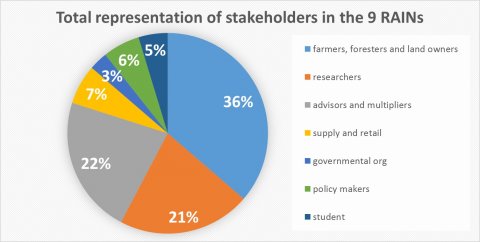
Between May and September 2017 the first Regional Agroforestry Innovation Networks (RAINs) were organized in the nine different regions participating in the AFINET project. Since the goal of this first meeting was to get a better insight in the main bottlenecks, knowledge gaps existing in practice, a good representation of practitioners was crucial. The RAINs are therefore a well-balanced group of different stakeholders from different categories: practitioners, multipliers (farmers’/forest owners’ associations, forest managers etc.), private supply and retail business, advisory services, researchers, policy makers and administrations.
In total 234 stakeholders attended these RAIN meetings. On average there were 26 participants per RAIN with a minimum of 10 and a maximum of 60. In almost all regions the attendance of farmers/practitioners exceeded 30% of the participants. In total 83 enthusiastic farmers took part in these regional meetings, giving input from their experiences. The main objective of these stakeholder consultations was to support agroforestry innovations and knowledge transfer, starting from bottlenecks and problems experienced by practitioners.
In order to gather these bottleneck and knowledge gaps, a brainstorming session was organized by each of the innovation brokers.
On the one hand, clear differences were identified among regions. For example; some of the regions lack any legal definition of agroforestry and have no access to subsidy schemes for agroforestry, while in other countries there is already legislation and financial support as a result of intensive contact between agroforestry experts and policy makers in the past. Specifically focusing on these differences among regions will stimulate cross pollination amongst them.
On the other hand there were also clear parallel problems, knowledge gaps and needs on which we will focus and work together with all partners and RAINs of AFINET.
The most frequently mentioned bottlenecks were the lack of information on cost benefit analysis of (traditional) AF systems and the lack of information on appropriate species/varieties choice (combinations of animal, tree, and crop) for specific climate, soil conditions and land use in order to maximize the benefits of agroforestry (production, soil improvement, parasitic antagonists). The lack of practical guidelines, good practices and well-functioning pilots were also mentioned in almost all regions, for example, how to adequately protect (efficient and economic) seedlings or trees against domestic and wild animals in an efficient and economic way.
Finally, also the need to get a better understanding of the demand, supply & marketing opportunities for AF products (e.g. fruits, nuts, new crops (e.g. hops), poplar wood) was seen as a priority.
This outcome of this first brainstorming session is an important base to give content to the Knowledge Cloud, fact sheets, content of future newsletters and to indicate which information exchanges and cooperation’s should be established among the regions to share expertise.
Besides this brainstorm there was time for participants to introduce themselves, a general outline to the AFINET project was presented and in some regions the meeting was combined with a field or farm visit.











